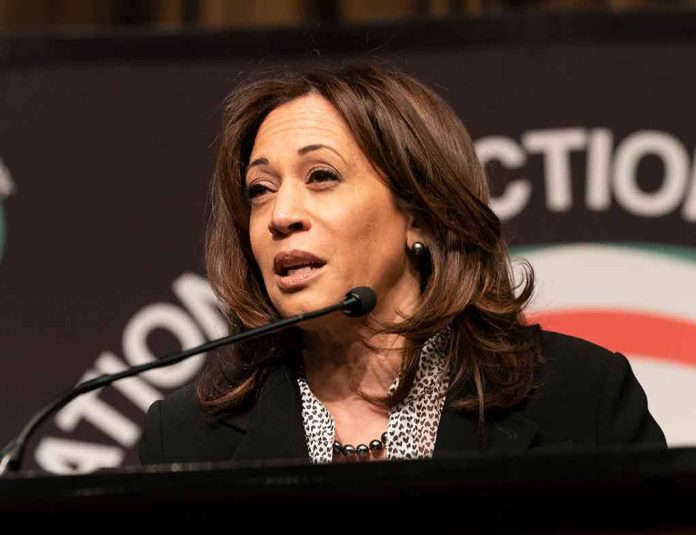
Vice President Kamala Harris’s “souls to the polls” campaign aimed at Christian voters has sparked significant backlash over her perceived disconnect between political stances and Christian values.
At a Glance
- Critics believe Harris’s policies are inconsistent with Christian values.
- Catholic voters, crucial in past elections, express dissatisfaction.
- Harris’s actions have been perceived as politically motivated.
- Skepticism rises about her genuine intentions towards Christians.
- Harris’s liberal policies alienate voters who feel their Christian values are being undermined by progressive ideologies.
Challenges with Catholic Voters
Criticism from Catholic voters predominantly stems from Harris’s perceived antipathy towards them, compounded by actions that challenge their religious beliefs. Notably, she is polling poorly among Catholics—a pivotal demographic that had significant impacts in the elections of 2016 and 2020. Her absence at the Archdiocese of New York’s Al Smith Dinner, a customary event for presidential aspirants, led many to question her commitment to engaging with Catholic values. By choosing to sidestep this important engagement, Harris not only distanced herself from Catholic voters but signaled a disregard for the religious traditions that have long been influential in American politics.
Republican strategist Ryan Girdusky commented on the situation, saying, “Kamala’s definitely been impacted negatively by a lack of support from Catholic voters,” emphasizing the critical role Catholics play in determining the presidency.
The “Souls to the Polls” Campaign
Harris’s “souls to the polls” initiative focused on driving voter turnout among Christians through church engagements, particularly in swing states with significant Catholic populations like Pennsylvania and Arizona. However, the campaign met mockery rather than resonance, with many online critics perceiving it as a shallow attempt to garner support. Harris’s advocacy for policies like the Equality Act and other measures perceived as opposing religious freedoms only deepened this divide.
Harris’s past comment to Christian students suggesting they were “at the wrong rally” further illustrates the discord with conservative Christian groups. Her outreach efforts have led to accusations of political expediency, rather than genuine faith-based dialogue. This approach only reinforces the belief among Christian voters that Democrats see religion as a tool for political gain, rather than a foundational element of American life.
Online Reactions and Faith Engagement
Amidst backlash, Harris continues to seek alignment with faith communities by speaking at churches and releasing ads centered on Christianity. Despite this, detractors such as Franklin Graham have expressed skepticism, historically opposing Harris due to her stances considered contrary to Christian doctrine.
“My father was a strong conservative all of his life, theologically as well as politically,” says Graham. “He would have never voted for or supported someone like Kamala Harris — someone who is almost anti-Christ in her positions. She has done nothing to support people of faith and what we believe and what we stand for.” Graham’s rebuke echoes a growing sentiment among evangelicals and Catholics alike, who see Harris’s policies as a direct threat to their religious freedoms and way of life.
Notably, there has been contrasting treatment regarding religious engagement by Democrats versus Republicans. Commentator Hugh Hewitt highlights how media projects Republican church visits as problematic while underreporting Democratic appearances before sizable Black congregations during elections. This double standard in media portrayal only further alienates conservative religious voters, as it becomes clear that faith-based outreach is acceptable for Democrats but condemned when Republicans do the same.
Controversies and Public Perceptions
Moreover, Harris’s efforts face severe criticism from some who deem her influenced by negative religious archetypes. The label of being under a “Jezebel spirit” further complicates her relationship with voters who hold strong Christian beliefs.
“It’s used as a means of justifying aggression. Christians are supposed to love their enemies. … But Christians are allowed to hate demons,” says author Matthew Taylor.
Despite these controversies, Harris’s narrative strives to consolidate faith with political duty. Her campaign continues to press the theme that faith necessitates action towards principles of nationhood and equality. However, the disconnect between her version of “faith in action” and traditional Christian values will likely continue to undermine her appeal to those who see religion as more than just a political talking point.








